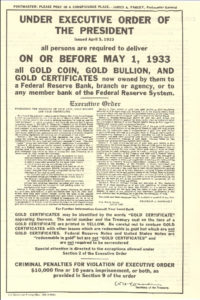Sometimes people say, “I guess we’ll just have to have a major economic or monetary crisis to wake people up and cause them to want a sound monetary system.”
There is one big problem with that refrain, however: A crisis or emergency oftentimes induces people to move in the opposite direction —in the direction of tyranny and oppression.
That’s because in a major crisis or emergency, people get afraid, so afraid that they are willing to sacrifice their liberty for the pretense of “safety” or “security” that government officials are offering them.
Of course, the trade is always sold as being “temporary.” As soon as the crisis or emergency is over, government officials say, they promise to restore the rights and liberties of the people.
A good example of this phenomenon took place in 1933, when President Franklin Roosevelt issued an executive order commanding every American to deliver his gold coins to the federal government. It would be difficult to find a better example of dictatorship and tyranny than that.
After all, gold coins and silver coins had been the official money of the American people for more than 125 years. That was the official money established by the Constitution. The Constitution had also expressly prohibited the states from making anything but gold tender and silver coins legal tender.
America’s gold-coin, silver-coin standard
After the Constitution called the federal government into existence, gold coins and silver coins were issued by the U.S. government. It was the soundest monetary system in history. By forsaking paper money and issuing sound, credible gold coins and silver coins, the U.S. government was precluded from plundering and looting people through inflation and monetary debasement for more than a century. America’s gold-coin, silver-coin standard was a major contributing factor of the tremendous increase in economic prosperity and people’s standard of living, especially in the late 1800s and early 1900s.
The Constitution permitted the federal government to borrow money. Such loans came in the form of federal bills, notes, and bonds. Sometimes people used these debt instruments to transact business. But everyone knew that they were all promises to pay money — i.e., promises to pay gold and silver — not money themselves.
The Fed and the Great Depression
In 1929, after a decade of extreme monetary manipulation by the Federal Reserve, which had been called into existence in 1913, the stock market suffered an enormous collapse, an event that led to the crisis and emergency known as the Great Depression.
It was that major crisis and economic emergency that Roosevelt seized upon to confiscate the gold-coin holdings of the American people. For some reason, he chose not to also confiscate their silver coins.
Notice something important about FDR’s action: The Constitution, which provided for a gold-coin, silver-coin monetary system, can only be amended through the process outlined in the Constitution. Roosevelt did not go through that process. Instead, he simply used the emergency to justify his nullification of the Constitution by executive decree. His action is a perfect example of how crises and emergencies can result in tyranny and oppression.
If an American failed to comply with Roosevelt’s order, he was subject to being targeted by federal officials with arrest, prosecution, a felony conviction, and fine and imprisonment. While there were no doubt some Americans who refused to comply and kept their gold hidden, most Americans dutifully complied with FDR’s command.
In return, they received Federal Reserve debt instruments. The problem, of course, was that while those debt instruments had previously promised to pay money (i.e., gold or silver), now they were irredeemable. That is, they now effectively promised to pay nothing.
Moreover, shortly after people turned in their gold, Roosevelt intentionally devalued the debt instruments that people were now holding in relationship to gold. In one fell swoop, he had imposed enormous financial losses for the American people.
Why did Americans go along with this revolutionary and illegal transformation of their monetary system and this tyrannical and communist-like nationalization of their gold holdings? One simple reason: The crisis had made them deathly afraid. And when people are overly afraid, they are willing, even eager, to trade away their liberty for the “safety” and “security” that public officials are offering them.
The welfare-warfare state
No doubt many Americans convinced themselves that once the crisis or emergency was over, federal officials would restore their gold-coin, silver-coin standard. It never happened. Federal officials were able to use their new paper money standard to finance the ever-burgeoning expenses of the welfare-warfare state way of life that FDR was introducing to America.
Gradually, as a result of the debasement of paper money from ever-increasing inflation of the money supply, silver coins were driven out of circulation. Today, while Americans are once again permitted to own gold (at least for now), the official money of the American people remains paper money, notwithstanding the express terms of the Constitution.
With his gold-confiscation scheme, FDR taught Americans a valuable lesson: Emergencies and crises are the time-honored way that people are induced to sacrifice their rights and liberties at the hands of their own government.
- What FDR Did to Our Money - November 12, 2025
- Which Way Forward for America? - May 8, 2024
- No Emergency Powers in the Constitution - March 14, 2024

